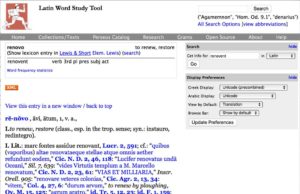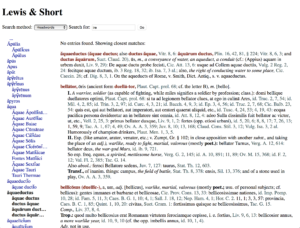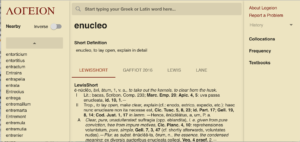Latin in English in Rome is a year-long course taught using the system developed by Reginald Foster, Papal Latinist for four popes, and offered by his co-author, Daniel McCarthy, lecturer at the:
PONTIFICIUM INSTITUTUM LITURGICUM
Latin in English in Rome
PIL course: Lingua Latina course number: 101032
QUICK LINKS TO CONTENTS:
Brief description
Instructor; contact Prof. Daniel McCarthy at this email address.
Enrol; contact the Registrar at this email address.
Guest accommodation; contact the Guestmaster at this email address.
Visa; contact the Guestmaster for documents this email address.
Aims
Schedule
Structure
No exams
Bibliography
Map
Instructor: Daniel P. McCarthy

Brief description
If you wish to understand the Latin language and its literature for the past 2,300 years, and you wish to study in English, this course will provide Latin’s bones, how the language is structured and connects together. This course is part of the preparatory year of linguistic study at the Pontifical Institute of Liturgy at Sant’Anselmo, Rome, although other people are welcome to enrol and join our study.
We shall use the system developed by Fr. Reginald Foster, OCD, papal Latinist for four popes over 40 years, as presented in the volume Ossa Latinitatis Sola ad mentem reginaldi rationemque: The Mere Bones of Latin according to the thought and system of Reginald, and its companion volume Ossium Carnes Multae e Marci Tullii Ciceronis epistulis: The Bones’ Meats aboundant from the epistles of Marcus Tullius Cicero. We presume no prior knowledge of the Latin language, but require dedicated personal study and daily application.
You may enrol for the first, Autumn semester only or for the entire year of studies. Because our system of studying Latin was developed by Reginald Foster and is distinctive in many ways, we recommend participants join us from the beginning, and not arrive half-way through the academic year-long course.
This course, Latin in English, may be taken together with Greek in English also taught at Sant’Anselmo.
The instructor
Daniel McCarthy is a lecturer in liturgy at the Pontifical Institute of Liturgy, having completed a doctorate in Sacred Liturgy in 2008 writing on ritual, and church art and architecture (description). He became a student of Reginald in 1999 and later his colleague as they wrote together the five volumes of the Latinitatis Corpus which presents the method of teaching the Latin language developed by Reginald. During the course of these twenty-one years of study and collaboration they also published with James Leachman their own English renditions of some 170 prayers of the Missale Romanum in The Tablet of London (listing) as well as chapters in Appreciating the Collect (description) and Transition in the Easter Vigil (description).
Enrol
People are welcome to enrol in this programme alone, who do not otherwise intend to study liturgy here. Please enrol before our first session on Monday, 5 October 2021. You may contact the Registrar directly at this email address and request information for enrolling in “PIL course nº 01032 for academic year 2021-2022”. You may correspond in English. The general page with other contact information for the office of the Registrar is available here.
The Pontifical Institute of Liturgy is part of the Pontifical Athenaeum of Sant’Anselm. This offering is now advertised on their web-site here. Because this course in English is new to our programme of studies, it appears for the first time in the Ordo Accademico 2021-2022.
Guest accommodation
The convenience of living in the same building where you study will prove invaluable in such a bustling city, although participants are free to arrange their own accommodation elsewhere (here is a list of local possibilities). You may enquire into guest accommodation at Sant’Anselmo, the Benedictine residence in the heart eternal city. We are located on the peak of the Aventine hill, one of the seven hills of ancient Rome. Meals are provided daily with the resident monastic community, but guests are also free to enjoy the restaurants in the surrounding city. This course is held on site.
For participants wishing a more immersive programme, at Sant’Anselmo we pray in Latin in sung Gregorian chant several times a day: 1) before lunch, 2) at vespers or evening prayer 3) and at compline concluding the day. Both morning prayer and the Eucharistic liturgy are celebrated in Italian.
Our residents are mostly male monks from diverse languages and cultures from throughout the world. Beginning in the Spring of 2022 several on-site guest rooms with ensuite toilet, sink and shower will be available for participants in this course. Please reserve your room early as accommodation is limited. We also have other guest rooms with shared rest-room facilities down the corridor.
Enquire about guest accommodation at Sant’Anselmo with the Guestmaster, who is fluent in English, at this email address.
Visa
Depending on your country of origin you may need a visa to stay in Italy for the duration of the course. Typically this is arragned with the help of the authority where you lodge. If you have secured guest accommodation at Sant’Anselmo, the Guestmaster at this email address will be ready to assist you with the necessary documents. You will likely have to apply for the visa at an Italian embassy or at a similar authority in your country of origin. The process may take some time, so please check ahead to allow for any eventuality.
Latin in English in Rome
Aims
During this programme of studies participants will …
- develop a clear understanding of the structure of the Latin language and its modes of expression over the past 2,300 years,
- render Latin texts into clear English and English texts into good Latin,
- understand the ambiguities of each language and
- be prepared to sit the proficiency exam in Latin for admission to the License cycle at the Pontifical Institute of Liturgy.
Schedule
Daily encounters will be held from 1 hour and 35 minutes (including a 5 minute break) 5 days a week, on every lecture day of academic year 2021-2022 from 5 October 2021 until the end of May 2022.
Structure of the Course
preparation
Our daily hour and-a-half encounters are too brief to include a full presentation of the material. So, participants are advised to read carefully and fully consider the Encounter from the Ossa volume in preparation for completing the corresponding ludus (below) each day. Participants are encouraged to come to our encounters with their questions ready.
Encounter
During our encounters we shall read authentic Latin texts from every era and genre of the language for a patient and careful understanding, and we shall render them into clear English. We shall also work with them to produce our own expressions in Latin.
After an initial stint focused on learning Latin, we anticipate spending Wednesdays reading liturgical texts together. These will largely be prayers from the Missale Romanum or texts from other liturgical books. We may consider sections of the Constitution on the Sacred Liturgy Sacrosanctum Concilium. Depending on travel restrictions due to the pandemic, later in the year we may schedule a few meetings on site in Rome where we will read Latin texts together in situ.
Ludus domesticus = home games
By the end of most encounters the instructor will present a ludus domesticus for the participants to complete daily, on their own, not working together, so that each person has to wrestle with his or her own understanding of the language until the concepts become clear. These are not typical homework exercises, but really are games to lead us into the adventure of learning the Latin language.
Each ludus shall be handed in either on the appointed day. The instructor will review them and hand them back in a subsequent encounter for discussion. In this way, with a bit of guidance from the instructor, the participants will teach themselves to understand the Latin language.
Limits
The Ossa volume has 105 Encounters intended to be spread out over three years of learning the Latin language, so that the mind may take its time to learn the material well. We have approximately 125 Encounters during this academic year 2021-2022 so we plan to cover in one academic year the material presented in the entire Ossa volume over three academic years. Because several of the ludi domestici are doubled-up, there are a total of at least 98 ludi for this entire program of study. This means that a ludus completed in private study will be due on most days. Completing a ludus daily and carefully reading the corresponding Encounter in the Ossa volume will require the participants to apply themselves to several hours of private study daily. After we have completed all of the Encounters and ludi, we shall continue with readings of the Latin language from many different authors and eras accompanied by additional ludi of the highest level.
Learning activities
- Private preparation by reading the encounters of Ossa.
- Group sight reading, understanding and rendering into English,
- Group sight rendering into Latin,
- Private study using the ludi domestici,
- Group review of corrected ludi domestici,
- Regular and frequent consultation of the dictionary,
- Learning how to use the dictionary,
- Learning how to continue studying Latin on your own,
- Reading and understanding liturgical texts (perhaps one day weekly).
Immersion in Latin
This is an immersive experience of the Latin language with the benefit of clear instruction in English. Other immersion courses require instruction and all conversation to be conduced in Latin. Experience has shown that such a programme requires a good deal of intuition to understand the concepts without use of one’s mother language such as English. There is no guessing with our instruction given in English, which provides clarity, promotes more ready progress and achieves a fuller understanding of the more advanced elements of the Latin language within the year of study.
Immersion is also achieved by working with the ludi domestici which present full Latin sentences well beyond the student’s ability. Participants are responsible only for what we have covered in class, while the full language is readily present from the first day. As participants gradually master more and more of the language each author’s thought becomes apparent, comes into focus and is made clearly accessible. Like a mighty river, Latin has been a medium of all human thought and expression for millennia, so we are invited to jump and swim with the current as we learn bit by bit how to understand and express ourselves in the Latin language.
Immersion is also achieved because form the first day participants will be asked to use the knowledge they have learned to rework genuine Latin sentences into their own expressions in Latin. This active production of Latin engages another critical skill of the participants. Because we begin with authentic Latin sentences, participants learn from native speakers.
Participants are welcome to participate join the monks praying in Latin, sung in Gregorian chant three times a day, at before lunch, before supper and after supper. In this way, you will participate actively in several language skills concurrently: listening, reciting, imitating, reading, and St. Augustine says that singing is praying twice!
Auditing
If you do not need academic credit, you are invited to attend provided that you participate fully by attending, completing Ludi domestici and engage actively in our daily encounters.
Exam
This course has no final exam, only the regular study and practice of the Latin language. Valuation will be determined on a continuous basis. Participants are expected to participate in our daily encounters and to complete and hand in the ludi regularly. The valuation mark indicates participation by attending our encounters and doing the ludi domestici rather than a particular proficiency in the Latin language. More than five absences or ludi not handed in per semester other than due to illness will result in a lower valuation at the end of the semester.
Academic credits
Successfully completing each semester confers 15 credits under the European Credit Transfer System (ECTS), for a total of 30 ECTS for the academic year awarded by the Pontificium Athenaeum Sancti Anselmi de Urbe. Students from other institutions of higher learning who take this course for credit are encouraged to see if their university acknowledges this standard European credit system, the ECTS.
Proficiency Exam
This course is intended, however, to prepare students for the proficiency exam required for entry into the licentiate programme of studies at the Pontifical Institute of Liturgy. The proficiency exam is administered at the beginning of the first semester annually, that is around the beginning of October. That exam texts not attendance but proficiency.
Bibliography
Each participant must have two essential books:
- A good dictionary:
- Students new to the study of Latin will appreciate the simpler and less expensive dictionary for the first semester of their study: SIMPSON, D.P., Cassell’s Latin Dictionary: Latin – English, English – Latin, Houghton – Mifflin – Harcourt, Boston – New York 1968 with later reprints, or equivalent with an English to Latin section. Also available in Rome through the several places mentioned below.
- By the second semester students will need their own copy of the LEWIS, C.T. – C. SHORT, A Latin Dictionary, Oxford UP, Oxford – New York 1879, thereafter reprinted so readily available as a used book. The printed volume is advantageous, but the resource is available online in several formatts (not without some difficulties).
- Students are expected to read the 105 encounters from this volume in preparation for our daily encounters: FOSTER, R.T. – D.P. McCARTHY, Ossa Latinitatis sola ad mentem Reginaldi rationemque: The Mere Bones of Latin according to the thought and system of Reginald (Latinitatis corpus 1), Catholic University of America Press, Washington DC 2016. Available in print from the publisher or in Rome through the several places mentioned below. Available also in digital format directly from the publisher here.
Highly recommended book
We shall study letters and tweets as they were originally composed by the master of Latinity, Cicero himself, as they are presented in: FOSTER, R.T. – D.P. McCARTHY, Ossium Carnes Multae e Marci Tullii Ciceronis epistulis: The Bones’ Meats aboundant from the epistles of Marcus Tullius Cicero (Latinitatis corpus 2), Catholic University of America Press, Washington DC 2021. Available in print from the publisher and from libraries in Rome mentioned below. Available also in digital format directly from the publisher here.
Other published resources
We recommend the additional workbook: Pooley, L., Ossa Ostensa: A proven system for demystifying Latin, Book One, Catholic University of America Press, Washington DC 2021. Soon to be available in print from the publisher and from libraries in Rome mentioned below. Available also in digital format directly from the publisher here.
Transition in the Easter Vigil: Becoming Christians. Paschali in vigilia Christiani nominis fieri, ed. D.P. McCarthy – J.G. Leachman (Documenta rerum ecclesiasticarum instaurata, Liturgiam aestimare: Appreciating the Liturgy 2), St. Michael’s Abbey Press, Farnborough 2011, description here and available directly from the publisher in the UK here.
Appreciating the Collect: An Irenic Methodology, ed. J.G. Leachman – D.P. McCarthy (Documenta rerum ecclesiasticarum instaurata, Liturgiam aestimare: Appreciating the Liturgy 1), St. Michael’s Abbey Press, Farnborough 2008, description here and available directly from the publisher in the UK here.
MCCARTHY, D.P. – J.G. LEACHMAN, Listen to the Word: Commentaries on Selected Opening Prayers of Sundays and Feasts, The Tablet, London 2009, out of print, available in the Sant’Anselmo library, description here. Sadly this volume is out of print and only a few copies remain available for purchase upon request.
Online resources
♦ Latin Work Study Tool with the Lewis and Short dictionary available here: Enter an inflected form of your word in the field under the heading “Dictionary Entry Lookup”, located in the column on the right.
♦ LEWIS and SHORT entry word search: This is another version of the above entry word search. This one is well laid-out for easier reading. Enter the dictionary entry for your word in the field at the top left of the page.
♦ Logeion
Even more Latin dictionaries are available on Logeion, including Lewis and Short. Enter the dictionary entry for your word in the field at the top of this page. If the search produces entries from several different dictionaries, they are listed first and you can choose which one you wish to consult.
English to Latin for advanced students
A complete English to Latin dictionary is: W. SMITH – T.D. HALL, A copious and critical English-Latin dictionary, Harper & brothers, New York 1850, is available in PDF format for download here, and in several versions from the Open Library here. You can also use this online research tool to look up Latin equivalents of English words from this dictionary here.
Several of these sources are available at Latinitium which includes a search field for terms both in latin from Lewis and Short and in English from Smith and Hall.
Recommended for full Latin reference
GILDERSLEEVE, B.L, – G. LODGE, Gildersleeve’s Latin Grammar, Bolchazy-Carducci, Wauconda IL 2003, reprint of 31985. This is available for online viewing and download.
Contact information
The instructor requests that you not phone him. Rather, please contact him via email at this address.
Pathway of Study
for
Latin in English in Rome
5 October 2021, Tuesday – organisational encounter
6 October 2021, Wednesday Encounter 1
Read and prepare before class Encounter 1 in Ossa.
During first Encounter we shall do together: Experience I, Ludus 01
This is an example page of how I approached the work here. We’ll do this first sentence together during our Encounter, just to help you see how to complete a ludus domesticus.
7 October 2021, Thursday, Encounter 2
Read and prepare before class Encounter 2 in Ossa.
Due during this second Encounter we shall do together: Experience I, Ludus 02
Encounter 2 PDF
For our third Encounter each participant is to complete
Encounter 3 docx …
8 October 2021, Friday, Encounter 3
Read and prepare before class Encounter 3 in Ossa.
Due during this second Encounter we shall do together: Experience I, Ludus 03
Encounter 3 PDF
For our third Encounter each participant is to complete
Encounter 4 docx …
11 October 2021, Monday, Encounter 4
Read and prepare before class Encounter 2 in Ossa.
Due during this second Encounter we shall do together: Experience I, Ludus 04
Encounter 4 PDF
For our third Encounter each participant is to complete Encounter 5 …
Latin in English in Rome
This course is offered in English at the Pontifical Institute of Liturgy housed at:
Sant’Anselmo
Piazza dei Cavalieri di Malta, 5
00153 Roma, Italia
See map below.
Materials
You may purchase the print and online edition of Ossa Latinitatis Sola from the publisher here.
You may purchase Ossa in print in several bookstores in Rome. Cassell’s dictionary is also available at the English desk at:
Pauline multimedia
via del Mascherino, 94
00193 Roma
Tel. 06.6872354
Fax: 06.68308093
contact Silvia: Inglese@paoline-multimedia.it
General enquiries: centro@paoline-multimedia.it
www.paoline-multimedia.it
Map:
You may also purchase materials at Libreria Sole, located directly across the street from the Gregorian University:
Libreria Sole
Via dei Lucchesi 20
00187 Rome, Italy
Tel.: +39 06 679 06 75
Cassell’s Latin dictionary is also available on Amazon.it here.
Latin resources
I have begun to develop a page of resources for the Latin language including: dictionaries, grammars, resources, texts, links.
External links
Read the announcement of the course on the website of the Athenaeum here.
Read about our publications, Latinitatis Corpus, presenting the method of teachin Latin developed by Reginald Foster during forty years of teaching in Rome, available here.
Read about Reginald Foster with links to his publications and publications about him here.
My abbey ran a brief article about this course available here.
PrayTell blog mentioned our course here.
© D.P. McCarthy, Latin in English in Rome, updated on 12 March 2021.



